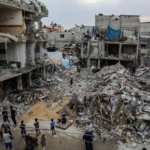It was Saturday morning. I was looking forward to a typical weekend after an exhaustive week, and then the email alert beeped.
It was a New York Times breaking news alert: ‘Palestinian militants fired barrages of rockets from Gaza into southern and central Israel in a surprise attack’.
I initially dismissed it as another one of those stories. A moment later, another alert from the same outlet came in.
“We are at war,” Prime Minister Benjamin Netanyahu said after Palestinian militants launched surprise rocket and ground assaults from Gaza into Israel.
- Don’t lose hope in Nigeria, Oyebanji tells Ekiti youths
- Northern leaders raise over N2bn for reconstruction of Zaria collapsed mosque
After careful analysis, I think the coverage of the Israel/Palestine conflict has been one of the most contentious and unbalanced in recent global media coverage of conflicts and wars.
The two sides are not equal in any measure – military might, population, economy, political status. Above all – one lives under the other’s total control, making it incomparable.
However, the so-called global media will always want to present the coverage as that of two sides at war, like India versus Pakistan – two nuclear powerhouses or the Cold War between Russia and the United States.
While in school, we learned the principles of balance and fairness in coverage and the need to ensure that all sides are given an equal opportunity in terms of time and that stories are not one-sided.
However, there have been recent debates on whether journalists are aptly upholding this principle in the coverage of specific stories or whether it is relevant. Some believe it’s difficult for journalists to balance the coverage of the Israel-Palestine conflict because you cannot just balance an unequal or unbalanced situation.
Watching outlets like the BBC or CNN, which claim to be balanced in their coverage, one would see reporters and anchors deployed to Ashkelon, Tel-Aviv, Jerusalem in Israel, and Gaza and Ramallah in Palestine.
But that is not balanced because, in most cases, nothing happens in those Israeli towns apart from the usual propaganda by the Israel Defence Forces (IDF).
Like the previous conflicts, two significant issues characterize the current situation across most international media. The narrative is that Hamas or Palestinians are the terrorists, aggressors and human rights violators.
Israel is defending itself and has the absolute right to do so. These views are being amplified more in the current conflict than in those that preceded it because, from the word go, the media has the impression that Hamas struck first. This perception has led to some of the most notorious, biased and unprofessional reporting I have ever encountered in my 20 years of following the crisis, as a professional.
Take a look at these headlines: “A tale of terror in Israel.” The scale of Hamas atrocities emerges – New York Times. “Haartz’s Horror at Home.” The Pain of the Press – writes CNN’s Oliver Darcy in his Reliable Sources newsletter that chronicles happenings in the media industry.
Another CNN reporter, Nic Robertson, speaking on the network’s air, likened the Hamas attack to the “atrocities committed by the Nazis” in death camps during World War II. CNN even launched “Tug of War: Attack on Israel,” a unique, daily 10-minute podcast hosted by David Rind.
The patterns are the same at the Associated Press, Reuters, AFP, and the BBC, where I had seen subjective headlines like: “How festival massacre unfolded.” “My wife and children have been kidnapped by Hamas.” “The international victims of Hamas’ assault on Israel”.
The unique homepage cover at HuffPost reads in caps: “ATROCITY ON AN APPALLING SCALE” as it quotes President Joe Biden’s address. Some of these pro-Israel narratives will be exported to several countries worldwide where the media cannot independently cover the conflict.
It’s difficult to comprehend why these media outlets could not report the atrocities that led to the recent attack on Israel and give background and context in their reportage.
Why won’t they tell us that Israel has held the 2.3 million Palestinians of Gaza under siege since 2007, blocking access to medical supplies, food, and other staples? For instance, data compiled by the Israel-Palestine Timeline showed that Israel had killed at least 12,000 Palestinians since September 29, 2000, including 2,434 children, while 2,646 Israelis were killed, including 143 children.
This year alone, before the beginning of the October 7 war, hundreds of Palestinian civilians, including women and children, were murdered by the Israeli military and settlers. Houses, schools and a significant portion of the Jenin refugee camp – one of the largest in the strip – were destroyed.
They also attacked and backed settlers to disperse worshippers at the Al-Aqsa holy mosque during the sacred month of Ramadan, sacked villagers from their homes, and continued to make them refugees in their own country.
In the last few days, schools like the United Nations elementary school in Jabalia, mosques and hospitals have been reduced to rubble. Netanyahu has ordered one million of the 2.3 million Gaza inhabitants to leave the area. These big media outlets have been silent on human rights abuses, war crimes, genocide, or nasty headlines in any of the above-mentioned outlets.
Voices of moderate politicians and analysts like former UK opposition leader and Member of Parliament Jeremy Corbyn don’t get enough airtime and space. His opinion on the crisis is worth taking note of.
“We may be witnessing the beginning of the total annihilation of Gaza and its people… What is unfolding is not a conflict of equals, but the systematic starvation, subjugation, and destruction of an unarmed civilian population,” he says.
We have to tune in to Aljazeera to hear words like occupied east Jerusalem, West Bank, or Gaza, occupied territories, Israel’s occupation army, or see the devastating images of IDF’s atrocities and the background information that will help us understand the current conflict and expose the hypocrisy and bias of the media and its contribution to the genocide taking place in the Palestinian territories.
A clip of the Palestinian ambassador to the UK ‘humiliating’ a BBC presenter with his answers to the journalist’s self-serving questions went viral globally and was republished by some of the UK’s leading tabloids. The clip reminded me of a question another BBC presenter, Stephen Sackur, asked a Libyan defense minister during the 2011 civil war: “How many civilians do you plan to kill before you liberate Misrata?”. I hope Mr. Sackur will have the same courage to ask the Israel defense minister similar questions today.
In my interaction with many people, I noticed a high level of disappointment with the media coverage of the crisis. Many are angry and are looking for options. The trust deficit is widening, journalists are no longer respected, and their biased reporting and tactics should be exposed and condemned.
Without credible and objective coverage from the mainstream media, people would resort to sharing unverified and doctored images from the past, incendiary video and audio clips, and fake news that will do more harm than good to society. All these benefits only one actor, Israel – and the mainstream media will have fueled the crisis through biased reporting.

 Join Daily Trust WhatsApp Community For Quick Access To News and Happenings Around You.
Join Daily Trust WhatsApp Community For Quick Access To News and Happenings Around You.


